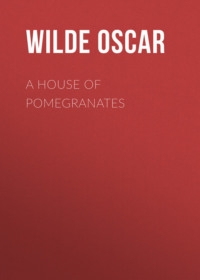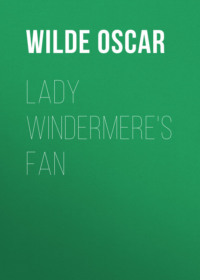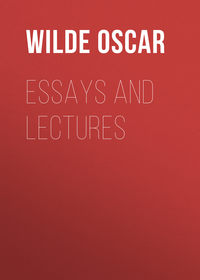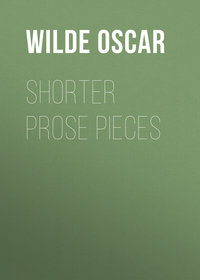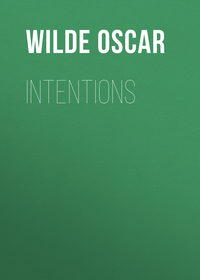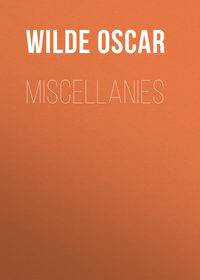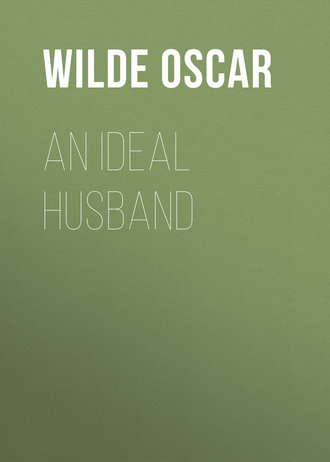 полная версия
полная версияAn Ideal Husband
lord goring. I love talking about nothing, father. It is the only thing I know anything about.
lord caversham. You seem to me to be living entirely for pleasure.
lord goring. What else is there to live for, father? Nothing ages like happiness.
lord caversham. You are heartless, sir, very heartless!
lord goring. I hope not, father. Good evening, Lady Basildon!
lady basildon. [Arching two pretty eyebrows.] Are you here? I had no idea you ever came to political parties!
lord goring. I adore political parties. They are the only place left to us where people don’t talk politics.
lady basildon. I delight in talking politics. I talk them all day long. But I can’t bear listening to them. I don’t know how the unfortunate men in the House stand these long debates.
lord goring. By never listening.
lady basildon. Really?
lord goring. [In his most serious manner.] Of course. You see, it is a very dangerous thing to listen. If one listens one may be convinced; and a man who allows himself to be convinced by an argument is a thoroughly unreasonable person.
lady basildon. Ah! that accounts for so much in men that I have never understood, and so much in women that their husbands never appreciate in them!
mrs. marchmont. [With a sigh.] Our husbands never appreciate anything in us. We have to go to others for that!
lady basildon. [Emphatically.] Yes, always to others, have we not?
lord goring. [Smiling.] And those are the views of the two ladies who are known to have the most admirable husbands in London.
mrs. marchmont. That is exactly what we can’t stand. My Reginald is quite hopelessly faultless. He is really unendurably so, at times! There is not the smallest element of excitement in knowing him.
lord goring. How terrible! Really, the thing should be more widely known!
lady basildon. Basildon is quite as bad; he is as domestic as if he was a bachelor.
mrs. marchmont. [Pressing lady basildon’s hand.] My poor Olivia! We have married perfect husbands, and we are well punished for it.
lord goring. I should have thought it was the husbands who were punished.
mrs. marchmont. [Drawing herself up.] Oh, dear no! They are as happy as possible! And as for trusting us, it is tragic how much they trust us.
lady basildon. Perfectly tragic!
lord goring. Or comic, Lady Basildon?
lady basildon. Certainly not comic, Lord Goring. How unkind of you to suggest such a thing!
mrs. marchmont. I am afraid Lord Goring is in the camp of the enemy, as usual. I saw him talking to that Mrs. Cheveley when he came in.
lord goring. Handsome woman, Mrs. Cheveley!
lady basildon. [Stiffly.] Please don’t praise other women in our presence. You might wait for us to do that!
lord goring. I did wait.
mrs. marchmont. Well, we are not going to praise her. I hear she went to the Opera on Monday night, and told Tommy Rufford at supper that, as far as she could see, London Society was entirely made up of dowdies and dandies.
lord goring. She is quite right, too. The men are all dowdies and the women are all dandies, aren’t they?
mrs. marchmont. [After a pause.] Oh! do you really think that is what Mrs. Cheveley meant?
lord goring. Of course. And a very sensible remark for Mrs. Cheveley to make, too.
[Enter mabel chiltern. She joins the group.]
mabel chiltern. Why are you talking about Mrs. Cheveley? Everybody is talking about Mrs. Cheveley! Lord Goring says – what did you say, Lord Goring, about Mrs. Cheveley? Oh! I remember, that she was a genius in the daytime and a beauty at night.
lady basildon. What a horrid combination! So very unnatural!
mrs. marchmont. [In her most dreamy manner.] I like looking at geniuses, and listening to beautiful people.
lord goring. Ah! that is morbid of you, Mrs. Marchmont!
mrs. marchmont. [Brightening to a look of real pleasure.] I am so glad to hear you say that. Marchmont and I have been married for seven years, and he has never once told me that I was morbid. Men are so painfully unobservant!
lady basildon. [Turning to her.] I have always said, dear Margaret, that you were the most morbid person in London.
mrs. marchmont. Ah! but you are always sympathetic, Olivia!
mabel chiltern. Is it morbid to have a desire for food? I have a great desire for food. Lord Goring, will you give me some supper?
lord goring. With pleasure, Miss Mabel. [Moves away with her.]
mabel chiltern. How horrid you have been! You have never talked to me the whole evening!
lord goring. How could I? You went away with the child-diplomatist.
mabel chiltern. You might have followed us. Pursuit would have been only polite. I don’t think I like you at all this evening!
lord goring. I like you immensely.
mabel chiltern. Well, I wish you’d show it in a more marked way! [They go downstairs.]
mrs. marchmont. Olivia, I have a curious feeling of absolute faintness. I think I should like some supper very much. I know I should like some supper.
lady basildon. I am positively dying for supper, Margaret!
mrs. marchmont. Men are so horribly selfish, they never think of these things.
lady basildon. Men are grossly material, grossly material!
[The vicomte de nanjac enters from the music-room with some other guests. After having carefully examined all the people present, he approaches lady basildon.]
vicomte de nanjac. May I have the honour of taking you down to supper, Comtesse?
lady basildon. [Coldly.] I never take supper, thank you, Vicomte. [The vicomte is about to retire. lady basildon, seeing this, rises at once and takes his arm.] But I will come down with you with pleasure.
vicomte de nanjac. I am so fond of eating! I am very English in all my tastes.
lady basildon. You look quite English, Vicomte, quite English.
[They pass out. mr. montford, a perfectly groomed young dandy, approaches mrs. marchmont.]
mr. montford. Like some supper, Mrs. Marchmont?
mrs. marchmont. [Languidly.] Thank you, Mr. Montford, I never touch supper. [Rises hastily and takes his arm.] But I will sit beside you, and watch you.
mr. montford. I don’t know that I like being watched when I am eating!
mrs. marchmont. Then I will watch some one else.
mr. montford. I don’t know that I should like that either.
mrs. marchmont. [Severely.] Pray, Mr. Montford, do not make these painful scenes of jealousy in public!
[They go downstairs with the other guests, passing sir robert chiltern and mrs. cheveley, who now enter.]
sir robert chiltern. And are you going to any of our country houses before you leave England, Mrs. Cheveley?
mrs. cheveley. Oh, no! I can’t stand your English house-parties. In England people actually try to be brilliant at breakfast. That is so dreadful of them! Only dull people are brilliant at breakfast. And then the family skeleton is always reading family prayers. My stay in England really depends on you, Sir Robert. [Sits down on the sofa.]
sir robert chiltern. [Taking a seat beside her.] Seriously?
mrs. cheveley. Quite seriously. I want to talk to you about a great political and financial scheme, about this Argentine Canal Company, in fact.
sir robert chiltern. What a tedious, practical subject for you to talk about, Mrs. Cheveley!
mrs. cheveley. Oh, I like tedious, practical subjects. What I don’t like are tedious, practical people. There is a wide difference. Besides, you are interested, I know, in International Canal schemes. You were Lord Radley’s secretary, weren’t you, when the Government bought the Suez Canal shares?
sir robert chiltern. Yes. But the Suez Canal was a very great and splendid undertaking. It gave us our direct route to India. It had imperial value. It was necessary that we should have control. This Argentine scheme is a commonplace Stock Exchange swindle.
mrs. cheveley. A speculation, Sir Robert! A brilliant, daring speculation.
sir robert chiltern. Believe me, Mrs. Cheveley, it is a swindle. Let us call things by their proper names. It makes matters simpler. We have all the information about it at the Foreign Office. In fact, I sent out a special Commission to inquire into the matter privately, and they report that the works are hardly begun, and as for the money already subscribed, no one seems to know what has become of it. The whole thing is a second Panama, and with not a quarter of the chance of success that miserable affair ever had. I hope you have not invested in it. I am sure you are far too clever to have done that.
mrs. cheveley. I have invested very largely in it.
sir robert chiltern. Who could have advised you to do such a foolish thing?
mrs. cheveley. Your old friend – and mine.
sir robert chiltern. Who?
mrs. cheveley. Baron Arnheim.
sir robert chiltern. [Frowning.] Ah! yes. I remember hearing, at the time of his death, that he had been mixed up in the whole affair.
mrs. cheveley. It was his last romance. His last but one, to do him justice.
sir robert chiltern. [Rising.] But you have not seen my Corots yet. They are in the music-room. Corots seem to go with music, don’t they? May I show them to you?
mrs. cheveley. [Shaking her head.] I am not in a mood to-night for silver twilights, or rose-pink dawns. I want to talk business. [Motions to him with her fan to sit down again beside her.]
sir robert chiltern. I fear I have no advice to give you, Mrs. Cheveley, except to interest yourself in something less dangerous. The success of the Canal depends, of course, on the attitude of England, and I am going to lay the report of the Commissioners before the House to-morrow night.
mrs. cheveley. That you must not do. In your own interests, Sir Robert, to say nothing of mine, you must not do that.
sir robert chiltern. [Looking at her in wonder.] In my own interests? My dear Mrs. Cheveley, what do you mean? [Sits down beside her.]
mrs. cheveley. Sir Robert, I will be quite frank with you. I want you to withdraw the report that you had intended to lay before the House, on the ground that you have reasons to believe that the Commissioners have been prejudiced or misinformed, or something. Then I want you to say a few words to the effect that the Government is going to reconsider the question, and that you have reason to believe that the Canal, if completed, will be of great international value. You know the sort of things ministers say in cases of this kind. A few ordinary platitudes will do. In modern life nothing produces such an effect as a good platitude. It makes the whole world kin. Will you do that for me?
sir robert chiltern. Mrs. Cheveley, you cannot be serious in making me such a proposition!
mrs. cheveley. I am quite serious.
sir robert chiltern. [Coldly.] Pray allow me to believe that you are not.
mrs. cheveley. [Speaking with great deliberation and emphasis.] Ah! but I am. And if you do what I ask you, I.. will pay you very handsomely!
sir robert chiltern. Pay me!
mrs. cheveley. Yes.
sir robert chiltern. I am afraid I don’t quite understand what you mean.
mrs. cheveley. [Leaning back on the sofa and looking at him.] How very disappointing! And I have come all the way from Vienna in order that you should thoroughly understand me.
sir robert chiltern. I fear I don’t.
mrs. cheveley. [In her most nonchalant manner.] My dear Sir Robert, you are a man of the world, and you have your price, I suppose. Everybody has nowadays. The drawback is that most people are so dreadfully expensive. I know I am. I hope you will be more reasonable in your terms.
sir robert chiltern. [Rises indignantly.] If you will allow me, I will call your carriage for you. You have lived so long abroad, Mrs. Cheveley, that you seem to be unable to realise that you are talking to an English gentleman.
mrs. cheveley. [Detains him by touching his arm with her fan, and keeping it there while she is talking.] I realise that I am talking to a man who laid the foundation of his fortune by selling to a Stock Exchange speculator a Cabinet secret.
sir robert chiltern. [Biting his lip.] What do you mean?
mrs. cheveley. [Rising and facing him.] I mean that I know the real origin of your wealth and your career, and I have got your letter, too.
sir robert chiltern. What letter?
mrs. cheveley. [Contemptuously.] The letter you wrote to Baron Arnheim, when you were Lord Radley’s secretary, telling the Baron to buy Suez Canal shares – a letter written three days before the Government announced its own purchase.
sir robert chiltern. [Hoarsely.] It is not true.
mrs. cheveley. You thought that letter had been destroyed. How foolish of you! It is in my possession.
sir robert chiltern. The affair to which you allude was no more than a speculation. The House of Commons had not yet passed the bill; it might have been rejected.
mrs. cheveley. It was a swindle, Sir Robert. Let us call things by their proper names. It makes everything simpler. And now I am going to sell you that letter, and the price I ask for it is your public support of the Argentine scheme. You made your own fortune out of one canal. You must help me and my friends to make our fortunes out of another!
sir robert chiltern. It is infamous, what you propose – infamous!
mrs. cheveley. Oh, no! This is the game of life as we all have to play it, Sir Robert, sooner or later!
sir robert chiltern. I cannot do what you ask me.
mrs. cheveley. You mean you cannot help doing it. You know you are standing on the edge of a precipice. And it is not for you to make terms. It is for you to accept them. Supposing you refuse —
sir robert chiltern. What then?
mrs. cheveley. My dear Sir Robert, what then? You are ruined, that is all! Remember to what a point your Puritanism in England has brought you. In old days nobody pretended to be a bit better than his neighbours. In fact, to be a bit better than one’s neighbour was considered excessively vulgar and middle-class. Nowadays, with our modern mania for morality, every one has to pose as a paragon of purity, incorruptibility, and all the other seven deadly virtues – and what is the result? You all go over like ninepins – one after the other. Not a year passes in England without somebody disappearing. Scandals used to lend charm, or at least interest, to a man – now they crush him. And yours is a very nasty scandal. You couldn’t survive it. If it were known that as a young man, secretary to a great and important minister, you sold a Cabinet secret for a large sum of money, and that that was the origin of your wealth and career, you would be hounded out of public life, you would disappear completely. And after all, Sir Robert, why should you sacrifice your entire future rather than deal diplomatically with your enemy? For the moment I am your enemy. I admit it! And I am much stronger than you are. The big battalions are on my side. You have a splendid position, but it is your splendid position that makes you so vulnerable. You can’t defend it! And I am in attack. Of course I have not talked morality to you. You must admit in fairness that I have spared you that. Years ago you did a clever, unscrupulous thing; it turned out a great success. You owe to it your fortune and position. And now you have got to pay for it. Sooner or later we have all to pay for what we do. You have to pay now. Before I leave you to-night, you have got to promise me to suppress your report, and to speak in the House in favour of this scheme.
sir robert chiltern. What you ask is impossible.
mrs. cheveley. You must make it possible. You are going to make it possible. Sir Robert, you know what your English newspapers are like. Suppose that when I leave this house I drive down to some newspaper office, and give them this scandal and the proofs of it! Think of their loathsome joy, of the delight they would have in dragging you down, of the mud and mire they would plunge you in. Think of the hypocrite with his greasy smile penning his leading article, and arranging the foulness of the public placard.
sir robert chiltern. Stop! You want me to withdraw the report and to make a short speech stating that I believe there are possibilities in the scheme?
mrs. cheveley. [Sitting down on the sofa.] Those are my terms.
sir robert chiltern. [In a low voice.] I will give you any sum of money you want.
mrs. cheveley. Even you are not rich enough, Sir Robert, to buy back your past. No man is.
sir robert chiltern. I will not do what you ask me. I will not.
mrs. cheveley. You have to. If you don’t.. [Rises from the sofa.]
sir robert chiltern. [Bewildered and unnerved.] Wait a moment! What did you propose? You said that you would give me back my letter, didn’t you?
mrs. cheveley. Yes. That is agreed. I will be in the Ladies’ Gallery to-morrow night at half-past eleven. If by that time – and you will have had heaps of opportunity – you have made an announcement to the House in the terms I wish, I shall hand you back your letter with the prettiest thanks, and the best, or at any rate the most suitable, compliment I can think of. I intend to play quite fairly with you. One should always play fairly.. when one has the winning cards. The Baron taught me that.. amongst other things.
sir robert chiltern. You must let me have time to consider your proposal.
mrs. cheveley. No; you must settle now!
sir robert chiltern. Give me a week – three days!
mrs. cheveley. Impossible! I have got to telegraph to Vienna to-night.
sir robert chiltern. My God! what brought you into my life?
mrs. cheveley. Circumstances. [Moves towards the door.]
sir robert chiltern. Don’t go. I consent. The report shall be withdrawn. I will arrange for a question to be put to me on the subject.
mrs. cheveley. Thank you. I knew we should come to an amicable agreement. I understood your nature from the first. I analysed you, though you did not adore me. And now you can get my carriage for me, Sir Robert. I see the people coming up from supper, and Englishmen always get romantic after a meal, and that bores me dreadfully. [Exit sir robert chiltern.]
[Enter Guests, lady chiltern, lady markby, lord caversham, lady basildon, mrs. marchmont, vicomte de nanjac, mr. montford.]
lady markby. Well, dear Mrs. Cheveley, I hope you have enjoyed yourself. Sir Robert is very entertaining, is he not?
mrs. cheveley. Most entertaining! I have enjoyed my talk with him immensely.
lady markby. He has had a very interesting and brilliant career. And he has married a most admirable wife. Lady Chiltern is a woman of the very highest principles, I am glad to say. I am a little too old now, myself, to trouble about setting a good example, but I always admire people who do. And Lady Chiltern has a very ennobling effect on life, though her dinner-parties are rather dull sometimes. But one can’t have everything, can one? And now I must go, dear. Shall I call for you to-morrow?
mrs. cheveley. Thanks.
lady markby. We might drive in the Park at five. Everything looks so fresh in the Park now!
mrs. cheveley. Except the people!
lady markby. Perhaps the people are a little jaded. I have often observed that the Season as it goes on produces a kind of softening of the brain. However, I think anything is better than high intellectual pressure. That is the most unbecoming thing there is. It makes the noses of the young girls so particularly large. And there is nothing so difficult to marry as a large nose; men don’t like them. Good-night, dear! [To lady chiltern.] Good-night, Gertrude! [Goes out on lord caversham’s arm.]
mrs. cheveley. What a charming house you have, Lady Chiltern! I have spent a delightful evening. It has been so interesting getting to know your husband.
lady chiltern. Why did you wish to meet my husband, Mrs. Cheveley?
mrs. cheveley. Oh, I will tell you. I wanted to interest him in this Argentine Canal scheme, of which I dare say you have heard. And I found him most susceptible, – susceptible to reason, I mean. A rare thing in a man. I converted him in ten minutes. He is going to make a speech in the House to-morrow night in favour of the idea. We must go to the Ladies’ Gallery and hear him! It will be a great occasion!
lady chiltern. There must be some mistake. That scheme could never have my husband’s support.
mrs. cheveley. Oh, I assure you it’s all settled. I don’t regret my tedious journey from Vienna now. It has been a great success. But, of course, for the next twenty-four hours the whole thing is a dead secret.
lady chiltern. [Gently.] A secret? Between whom?
mrs. cheveley. [With a flash of amusement in her eyes.] Between your husband and myself.
sir robert chiltern. [Entering.] Your carriage is here, Mrs. Cheveley!
mrs. cheveley. Thanks! Good evening, Lady Chiltern! Good-night, Lord Goring! I am at Claridge’s. Don’t you think you might leave a card?
lord goring. If you wish it, Mrs. Cheveley!
mrs. cheveley. Oh, don’t be so solemn about it, or I shall be obliged to leave a card on you. In England I suppose that would hardly be considered en règle. Abroad, we are more civilised. Will you see me down, Sir Robert? Now that we have both the same interests at heart we shall be great friends, I hope!


